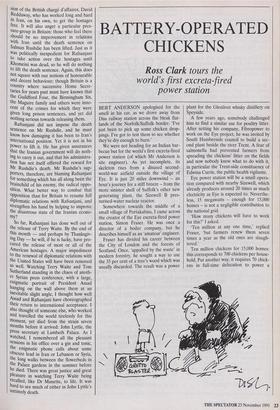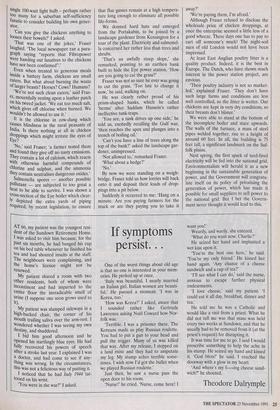BATTERY-OPERATED CHICKENS
Ross Clark tours the
world's first excreta-fired power station
BERT ANDERSON apologised for the smell in his car, as we drove away from Diss railway station across the bleak flat- lands of the Norfolk/Suffolk border. 'I've just been to pick up some chicken drop- pings. I've got to test them to see whether they're dry enough to burn.'
We were not heading for an Indian bar- becue but for the world's first excreta-fired power station (of which Mr Anderson is site engineer). As yet incomplete, its skeleton rises from a disused second- world-war airfield outside the village of Eye. It is just 20 miles downwind - an hour's journey for a stiff breeze - from the more sinister shell of Suffolk's other new generating plant, the Sizewell B pres- surised-water nuclear reactor.
Somewhere towards the middle of a small village of Portakabins, I came across the creator of the Eye excreta-fired power station, Simon Fraser. He was once a director of a boiler company, but he describes himself as an 'amateur' engineer.
Fraser has divided his career between the City of London and the forests of Scotland. Once, 'appalled by the waste' in modern forestry, he sought a way to use the 35 per cent of a tree's wood which was usually discarded. The result was a power plant for the Glenlivet whisky distillery on Speyside.
A few years ago, somebody challenged him to find a similar use for poultry litter. After setting his company, Fibropower to work on the Eye project, he was invited by South Humberside council to build a sec- ond plant beside the river Trent. A fear of salmonella had prevented farmers from spreading the chickens' litter on the fields and now nobody knew what to do with it, in particular the Trent-side constituency of Edwina Currie, the public health vigilante.
Eye power station will be a small opera- tion compared with nearby Sizewell, which already produces around 20 times as much electricity as Eye is expected to. Neverthe- less, 15 megawatts - enough for 15,000 homes - is not a negligible contribution to the national grid.
'How many chickens will have to work for this?' I asked.
'Ten million at any one time,' replied Fraser, 'but farmers renew them seven times a year as the old ones are slaugh- tered.'
Ten million chickens for 15,000 homes: this corresponds to 700 chickens per house- hold. Put another way, it requires 70 chick- ens in full-time defecation to power a single 100-watt light bulb – perhaps rather too many for a suburban self-sufficiency fanatic to consider building his own gener- ator.
'Can you give the chickens anything to loosen their bowels?' I asked.
That was one of the jokes,' Fraser laughed. 'The local newspaper ran a para- graph saying "reports that Fibropower were handing out laxatives to the chickens have not been confirmed".'
Even when treated to generous meals inside a battery farm, chickens are small eaters. But what about burning the waste of larger beasts? Horses? Cows? Humans?
'We're not such clean eaters,' said Fras- er, mournfully resting upon a leather patch on his tweed jacket. 'We eat too much salt, Which gives off chlorine when burned. We wouldn't be allowed to use it.'
It is the chlorine in cow-dung which causes blindness in the rural peasants of India. Is there nothing at all in chicken droppings which might irritate the eyes of Eye?
'No,' said Fraser; 'a farmer tested them and found they give off no nasty emissions. They contain a lot of calcium, which reacts With otherwise harmful compounds of Chlorine and sulphur, and the ammonia they contain neutralises dangerous oxides.'
Salmonella spores — another possible Pollutant — are subjected to too great a heat to be able to survive. I was shown a cross-section of the Eye boiler which clear- ly depicted the extra yards of piping required, by recent legislation, to ensure
that flue gasses remain at a high tempera- ture long enough to eliminate all possible life-forms.
We donned hard hats and emerged from the Portakabin, to be joined by a landscape gardener from Kensington for a tour of the plant. Electricity and salmonel- la concerned her rather less than trees and shrubs.
'That's an awfully steep slope,' she remarked, pointing to an earthen bank built to hide the Eye power station. 'How are you going to cut the grass?'
Fraser was not so sure he ever was going to cut the grass. 'Too late to change it now,' he said, walking on.
He was clearly rather proud of his prism-shaped banks, which he called 'berms' after Saddam Hussein's rather ineffective tank-traps.
'You see, a tank drives up one side,' he told us, excitedly recalling the Gulf war, `then reaches the apex and plunges into a trench of boiling oil.'
'Can't you have a line of trees along the top of the bank?' asked the landscape gar- dener, unimpressed.
`Not allowed to,' remarked Fraser. 'What about a hedge?'
'No.'
By now we were standing on a weigh- bridge. Fraser told us how lorries will back onto it and deposit their loads of drop- pings into a pit below.
Suddenly it occurred to me: 'Hang on a minute. Are you paying farmers for the muck or are they paying you to take it away?'
'We're paying them, I'm afraid.'
Although Fraser refused to disclose the wholesale price of chicken droppings, at once the enterprise seemed a little less of a good wheeze. These days one has to pay to cart off someone's muck! The night-soil men of old London would not have been impressed.
At least East Anglian poultry litter is a quality product. Indeed, it is the best in Europe. The Dutch, who have shown much interest in the power station project, are envious.
'Their poultry industry is not so market- led,' explained Fraser. 'They don't have such large farms and conditions are less well controlled, so the litter is wetter. Our chickens are kept in very dry conditions, so their breasts don't blister.'
We were able to stand at the bottom of the incomplete boiler and stare upwards. The walls of the furnace, a mass of steel pipes welded together, rise to a height of around 60 feet. In all, the building is 75 feet tall, a significant landmark on the Suf- folk plains.
Next spring, the first spark of turd-fired electricity will be fed into the national grid. Environmentalists will herald it as a new beginning in the sustainable generation of power, and the Government will congratu- late itself on its policy of privatising the generation of power, which has made it possible for small suppliers to sell power to the national grid. But I bet the Govern- ment never thought it would lead to this.









































































 Previous page
Previous page